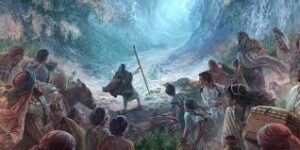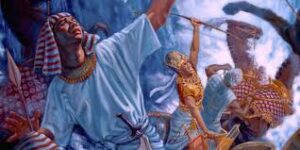The Israelites Went Through the Sea on Dry Land
14: 15-31
The waters were divided and the Israelites went through on dry land DIG: When you retrace the movement from fear (14:10-12) to faith (14:29-31), what was the turning point? What do you think it meant to the Israelites that the same waters that saved them destroyed the Egyptians? How do you think the Israelites would have described God to someone who had not seen these events firsthand?
REFLECT: What is the one pursuing army you fear right now? How is God leading you up to this point? In circles? In the dark? Through the fire? Or do you feel abandoned by those you have trusted? In what way might this passage help you to trust God with your fears? What battle would you like God to fight for you right now?
Here before us is one of the most remarkable miracles recorded in the TaNaKh, certainly the most remarkable in connection with the history of Isra’el. From this point onwards, whenever the servants of God would remind the Hebrews of God’s power and greatness, reference is almost always made to what He did for them at the Sea of Reeds.267 It left a lasting impression upon the writers of the TaNaKh (Joshua 24:6-7; Nehemiah 9:9; Psalm 78:13, 106:7-10; Isaiah 50:2, 51:15; Jeremiah 31:35; Micah 7:15; Nahum 1:3-4a).
Then ADONAI said to Moses His prophet: Why are you crying out to Me? The time for pleading and prayer was over. The time for action had arrived. Tell the Israelites to move on (14:15). In spite of Isra’el’s unbelief, God commanded: Raise your staff and stretch out your hand over the Sea of Reeds to divide the water so that the Israelites can go through on dry ground (14:16). The term dry ground refers to something that is dry, withered, drained or without moisture. In Scripture, it is the exact opposite of, or contrast to, the sea. In the Creation account, for example, the separation of the dry ground on the third day (Genesis 1:9), is contrasted to the waters that are gathered into one place.268 When Moses raised his staff over the Sea of Reeds, he was not trying to perform a trick with a magic wand. God was working through His servant, and the mighty power of God Himself was in Moses’ staff (Isaiah 10:26).269
God’s moment had come and He is the main character of this scene. He proclaimed: I will harden the hearts of the Egyptians so that they will go in after them. The verb is the same word used in verses 4 and 8 (and elsewhere) of God hardening Pharaoh’s heart. Literally it reads I am hardening and reflects continuous action. Now God stiffens the resolve of the entire Egyptian army to chase after the people of Isra’el and drive them into the Sea of Reeds. And I will gain glory through Pharaoh and all his army, through his chariots and his horsemen (14:17). This was the ultimate purpose to be accomplished there. Not only would the Egyptians who were chasing after them realize this, but God said that the Egyptians who remained behind in Egypt would also know that He was ADONAI when He gained glory through Pharaoh, his chariots and his horsemen (14:18).
The Egyptians apparently reached the vicinity of the people of Isra’el somewhere near the early evening. Then the Angel of God, the Second Person of the Trinity, Yeshua Messiah, who had been traveling in front of Israel’s army, withdrew and went behind to protect them (Psalm 105:39). The Sh’khinah glory, or the pillar of cloud, also moved from in front and stood behind them, coming between the camp of Egypt and the camp of Isra’el (14:19-20a). This was the Sh’khinah glory, the same figure who appeared in the burning bush. He often made His presence known to His people in that way (3:2, 19:9, 33:9-10).
Throughout the night the cloud brought darkness to the Egyptians and light to the Israelites; so neither went near the other all night long (14:20b). The Egyptians were clothed in darkness, as they had been during the ninth plague; Pharaoh, the embodiment of the sun-god Ra, could not bring light to his people. But the people of Isra’el were bathed in the light of the pillar of fire. Symbolically, then, the people of Isra’el represented the children of light, while the Egyptians represented the children of darkness.
Thus, while the Egyptians were forced to be idle, Moses stretched out his hand over the waters, and all that night ADONAI drove the sea back with a supernatural strong east wind and turned it into dry land. It would be difficult to explain this apart from a miracle.270 While the wind kept the waters divided, the Israelites went through that night on dry ground, a fact marveled at by later psalmists and prophets (Psalm 66:6, 106:9, Isaiah 51:10, 63:11-13), with a wall of water on their right and on their left (14:21-22). The divide had to be wide enough to allow two to three million people, and their flocks and herds, to walk through it. What an awesome sight it must have been!

The best commentary on this is Hebrews 11:29a. By faith the people passed through the Red Sea as on dry land. From this it is very clear that the water did not begin to divide until the feet of the people of Isra’el stepped into it. Otherwise it would not have been by faith. It is equally clear that the water did not divide all at once. It does not require faith to begin a journey when you can see the end; but to begin a journey when you can only see a few steps in front of you, well, that’s faith.271
Some time after Isra’el entered the Sea of Reeds, the Sh’khinah glory must have stood aside and allowed the Egyptian army to pursue the evil intent of their hearts. The Egyptians pursued them, not frightened by the miracle of the divided waters. And all Pharaoh’s horses and chariots and horsemen followed them into the Red Sea (14:23). They obviously believed they could also go through the parted waters and overtake the Hebrews quickly.
During the last watch of the night, or the morning watch ending at daybreak, ADONAI looked down from the pillar of fire and cloud at the Egyptian army and threw it into confusion (14:24). According to Psalm 77:16-19, the Lord caused a rainstorm, lightning, thunder, and an earthquake.272 As the water began to seep down on the floor of the Red Sea, God made the wheels of their chariots come off so that they had difficulty driving. This hit right at the Egyptian’s symbol of power – their mighty chariots! The Egyptians were literally in over their heads, and as their chariots began to break down they said: Let’s get away from the Israelites! ADONAI is fighting for them against Egypt (14:25). But this realization came far too late.

The crossing might have begun about nine o’clock in the evening, if not before, and lasted until sunrise (so the Israelites could see what was about to happen). When the Israelites were safe on the opposite shore, ADONAI said to Moses again: Raise you staff and stretch out your hand over the Sea of Reeds so that the waters may flow back over the Egyptians and their chariots and horsemen. With the morning light, the strong wind that held the waves back was released. So Moses stretched out his hand over the Red Sea, and at daybreak the waters went back into place. At daybreak, as the sun-god Ra rose in the east, Pharaoh’s forces were being destroyed. As the Egyptians reversed their chariots to take flight, the waters descended upon them and ADONAI swept them to their death.273 The water flowed back and covered the chariots and horsemen – the entire army of Pharaoh that had followed the Israelites into the Sea of Reeds. We know from history that Amenhotep II survived, but just as he had tried to kill all the Hebrew baby boys (see the commentary on Exodus Ah – So God Was Kind to the Midwives), his entire army was drown (Psalm 106:7-11).
Then we have a simile of Isra’el’s deliverance. First, Israel walked through the sea, but the Israelites went through on dry ground, with a wall of water on their right and on their left (14:29). Secondly, God saved Isra’el that day. That day ADONAI saved Isra’el from the hands of the Egyptians, and as a grim reminder, Isra’el saw the Egyptians lying dead on the shore of the Sea of Reeds (14:30). Thirdly, Isra’el responded to the great work of God. When the Israelites saw the great power ADONAI displayed against the Egyptians, the people feared ADONAI and put their trust in Him and in Moses, His servant (14:31). Like Thomas many centuries later (John 20:24-28), they believed after having seen. An outburst of song followed.
Paul tells us that the exodus speaks to believers today. He basically argues that the Israelites were specially chosen people and they received the great blessing of being delivered by God’s work at the Sea of Reeds. Yet, though they had been set apart by God, their bodies were scattered over the desert because of disobedience (First Corinthians 10:1-6). Paul warned the church at Corinth and believers today that we ought to beware of, and take a warning from, this incident. John Calvin commented on this verse when he said, “If God did not spare them, He will not spare us, for our situation is the same as theirs.”274



Leave A Comment